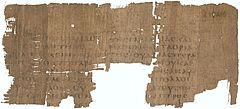Papirus 25

|
| Data powstania
|
IV wiek
|
| Rodzaj
|
Kodeks papirusowy
|
| Numer
|

|
| Zawartość
|
Ewangelia Mateusza †
|
| Język
|
grecki
|
| Miejsce przechowywania
|
Staatliche Museen zu Berlin
|
Papirus 25 (według numeracji Gregory-Aland), oznaczany symbolem  – grecki rękopis Nowego Testamentu pisany na papirusie, w formie kodeksu. Paleograficznie datowany jest na IV wiek. Zawiera fragment Ewangelii Mateusza.
– grecki rękopis Nowego Testamentu pisany na papirusie, w formie kodeksu. Paleograficznie datowany jest na IV wiek. Zawiera fragment Ewangelii Mateusza.
Opis
Zachowały się jedynie fragmenty kodeksu z tekstem Ewangelii Mateusza 18,32-34; 19,1-3.5-7.9-10[1][2].
Tekst
Przez niektórych uważany jest za tekst Diatessaronu.[3] Kurt Aland nie zaklasyfikował go do żadnej kategorii[1].
Historia
Ernst von Dobschütz umieścił go na liście rękopisów Nowego Testamentu, w grupie papirusów, dając mu numer 25[4].
INTF datuje go na IV wiek[1][2].
Obecnie przechowywany jest w Staatliche Museen zu Berlin (Inv no. 16388) w Berlinie[1][2].
Zobacz też
Przypisy
- ↑ a b c d K. Aland, B. Aland: The Text of the New Testament: An Introduction to the Critical Editions and to the Theory and Practice of Modern Textual Criticism. przeł. Erroll F. Rhodes. Michigan: William B. Eerdmans Publishing Company, 1995, s. 97. ISBN 978-0-8028-4098-1. (ang.).
- ↑ a b c Liste Handschriften, [w:] Institute for New Testament Textual Research, Münster [dostęp 2013-07-10] .???
- ↑ O. Stegmuller, " Ein Bruchstuck aus dem griechischen Diatessaron (P. 16 388)," ZNW 37 (1938), 223-229; Repertorium des griechischen christlichen Papyri, I. Biblische Papyri, ed. K. Aland, PTS 18 (Berlin/New York 1976), 246; C. Peters, "Ein neues Fragment des griechischen Diatessaron? " Bib. 21 (1940), 51-55.
- ↑ K. Aland, B. Aland: The Text of the New Testament: An Introduction to the Critical Editions and to the Theory and Practice of Modern Textual Criticism. przeł. Erroll F. Rhodes. Michigan: William B. Eerdmans Publishing Company, 1995, s. 74. ISBN 978-0-8028-4098-1. (ang.).
Bibliografia
- Otto Stegmüller, Ein Bruchstück aus dem griechischen Diatessaron, ZNW 37 (1938), pp. 223–229.
- ↑ skatalogowany również pod numerem P 58
- ↑ fragment początkowo oznakowany jako P 67